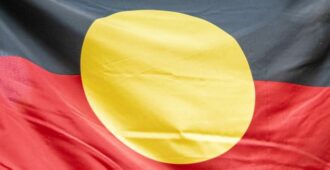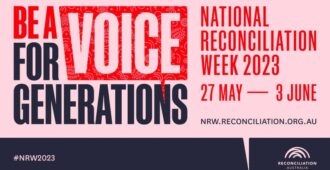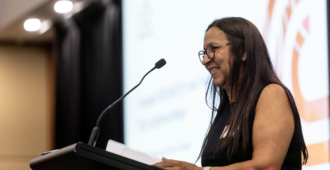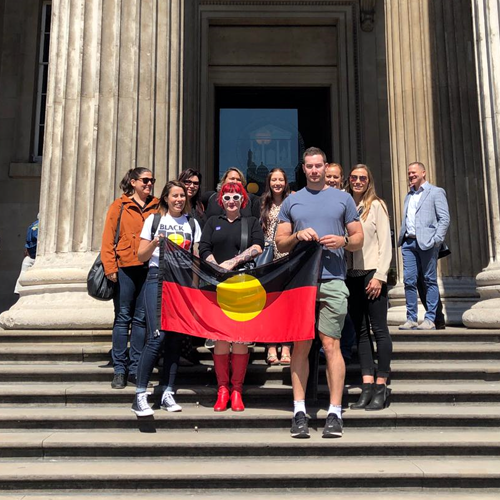
When Simone Sherriff heard that she’d be travelling to London as part of the Melbourne Poche Leadership Fellows Program for emerging Indigenous leaders, she wondered what on earth the English, of all people, had to teach her about Indigenous leadership.
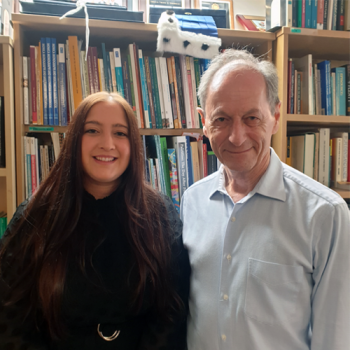
“But now I can see why it’s important to go to the ‘heart of empire’ to understand its systems of power, because that’s where our systems come from,” says Simone, who is a Project Officer and PhD student with the Sax Institute’s SEARCH Program, Australia’s largest long-term study of the health and wellbeing of urban Aboriginal children.
“It was interesting to reflect on the similarities between the University of Sydney where I’m doing my PhD and the University of Oxford, right down to surrounding street names.”
Simone, a Wotjobaluk woman whose people are from the Wimmera region in Victoria, won a place this year on the prestigious Melbourne Poche Indigenous Leadership Fellows Program, which takes in 12 Aboriginal and Torres Strait Islander people from across Australia annually. The aim is to build up a cohort of Indigenous researchers and link them with people nationally and internationally to grow their reach of influence, build networks and gain skills and capacity. The program consists of three modules, two based in Melbourne and a third in London.
“The week in London was amazing,” Simone says. “We got to network with Indigenous scholars from the University of Oxford, King’s College London and the School of Oriental and Asian Studies (SOAS). We learnt about the Rhodes Must Fall movement and the work done by Indigenous scholars to ‘decolonise’ or indigenise their institutions.”
The group had discussions around leadership with Australia’s Deputy High Commissioner Matt Anderson, as well as a short meeting with High Commissioner George Brandis. Simone also met with Sir Michael Marmot, Professor of Epidemiology at University College London, to discuss her PhD on childhood obesity in urban Aboriginal children and work around food security.
One highlight of the trip, albeit a disturbing one, was visiting the British Museum in London and the Pitt Rivers Museum in Oxford, which house vast collections of artefacts from many cultures, including sacred objects and human remains.
“It was challenging to see all these stolen artefacts, but it was an important exercise to understand these institutions better. Hopefully we can use that knowledge to enact change, and get these artefacts returned to their owners,” Simone says.
She says the trip got her thinking about power, spheres of influence and how Indigenous people can expand their own different forms of leadership to drive change within Western institutions.
“I was struck by our conversations with Dr Meera Sabaratnam, who lectures at SOAS and who talked to us about making the British university system better for African or Indigenous people to come and study. She talked about the need to take small steps to achieve your goals. For example, the British may not be ready to hear talk about reparations, so it might be wise to use more palatable terms like ‘redress’”.
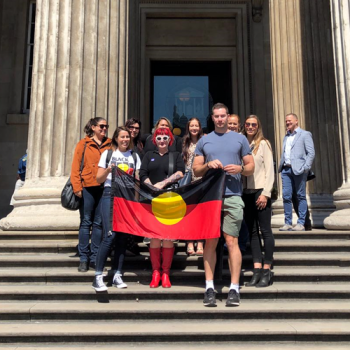
Simone says education is one area where she hopes to focus her leadership skills. She says Australian universities are only diversifying at the surface level, in that they have people from other cultural backgrounds studying there now. But they still have the structures, systems and attitudes built on Eurocentric values and ways of knowledge production.
“To ‘decolonise’ the university and allow for true diversity of attitudes and knowledge production, and create a space for Indigenous people to exist there fully and feel safe and valued, we need to break down these systems left behind by the colonisers,” she says.
“I’m the first person in my family to go to university. I’m passionate about ensuring more Aboriginal people have the opportunity to get a good education and the best start to life. I remember doing my Masters and I was with other people whose families had all gone to uni and so they felt comfortable there. Whereas I felt so out of place. There’s cultural change that’s needed. We need to make universities the kind of place where Aboriginal and Torres Strait Islander people feel comfortable and safe.”
She says the systems built at these institutes to exclude Indigenous people remain. Without breaking them down and making them inclusive for all people, Indigenous people will continue to face the same challenges.
“I also think universities need to take ownership and acknowledge the part they played in the mistreatment of Indigenous people,” she adds.
Simone is also interested in co-creating research with Indigenous communities and shifting the power axis from the researchers to the communities themselves.
“We have a long history of researchers going out to the communities, collecting data there and then doing whatever they like with it. I want to get more people in Aboriginal communities to have capacity and training in research so they can run their own projects without necessarily having to rely on outside organisations.”
Simone is a project officer with the Sax Institute’s SEARCH (Study of Environment on Aboriginal Resilience and Child Health) program. It is Australia’s largest long-term study of the health and wellbeing of urban Aboriginal Children.
While 80% of the Aboriginal population lives in non-remote urban and regional areas, recent data suggests only 10% of Aboriginal health research focuses on the needs of urban Aboriginal people; and even less on childhood, where health inequity begins.
SEARCH is a unique resource for understanding the causes of ill health in urban Aboriginal children, and for developing and implementing strategies to improve their health.

